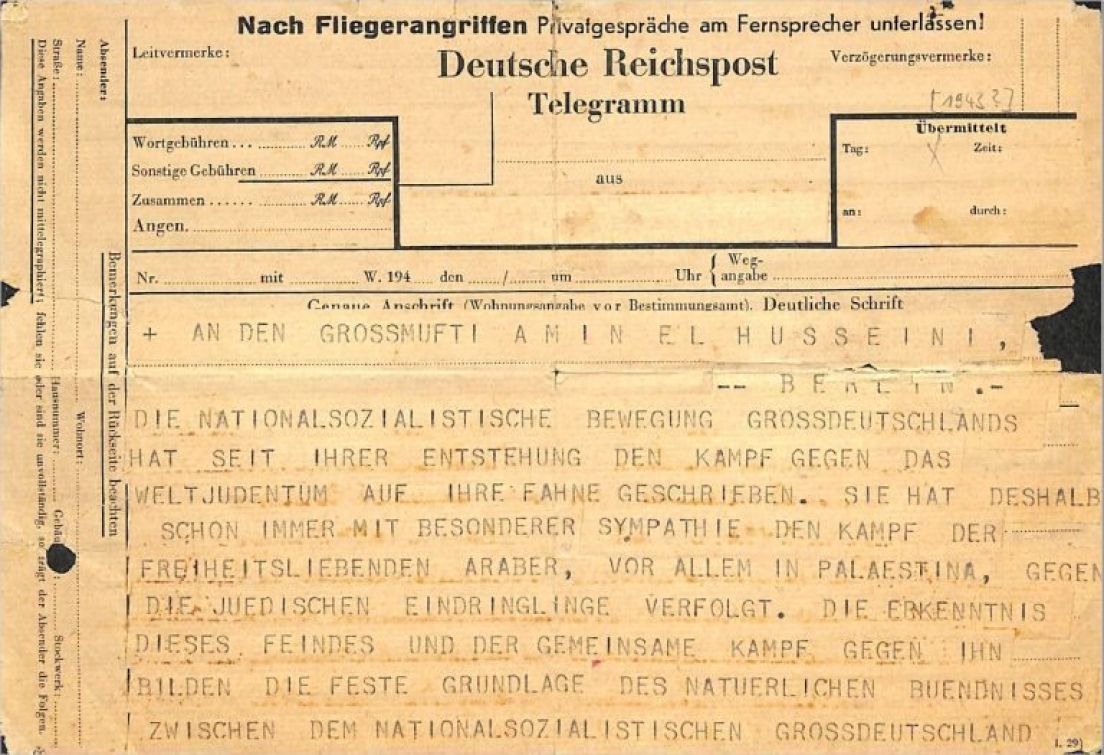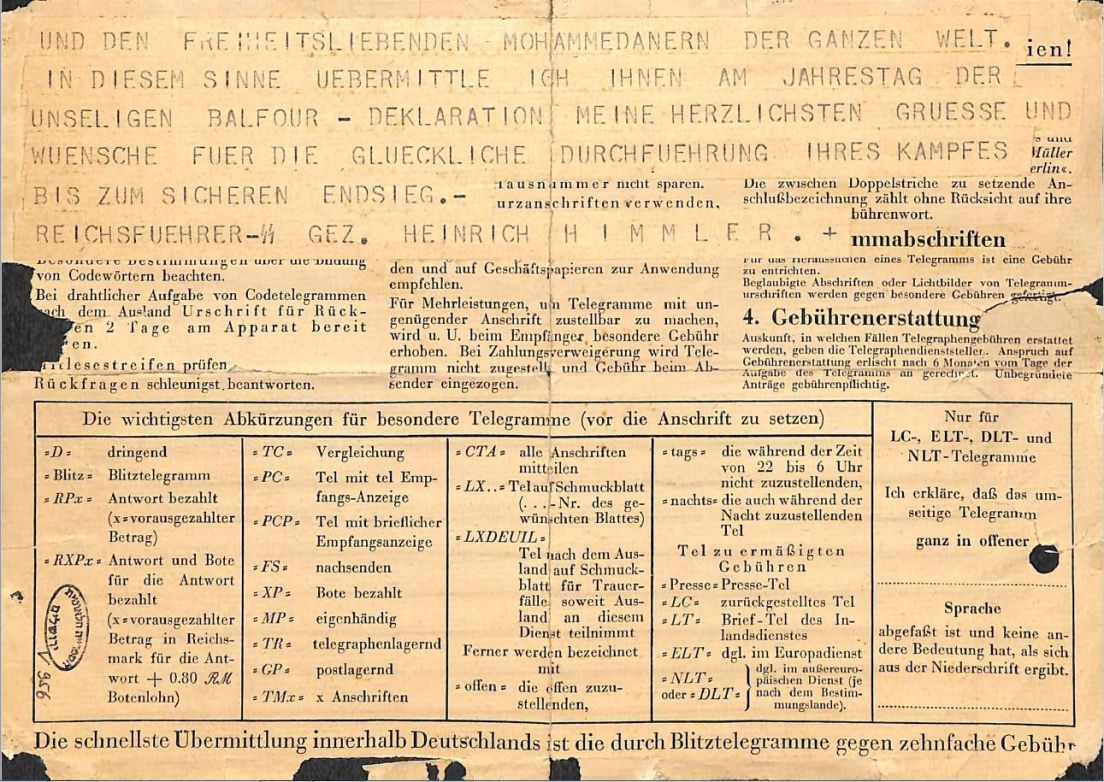
S.S. head Heinrich Himmler with the Grand Mufti of Jerusalem Haj Amin al-Husseini in 1943.
Heinrich Himmler’s message, made public this week by Israel National Library, was sent to mark the ‘wretched’ Balfour Declaration and noted a shared recognition of ‘the enemy,’ world Jewry.
A year and half ago, Prime Minister Benjamin Netanyahu sparked controversy with comments about the ties between the Nazi regime and the Grand Mufti of Jerusalem during World War II. Netanyahu claimed that it was Mufti Haj Amin al-Husseini himself who convinced Nazi leader Adolf Hitler to exterminate Europe’s Jews, before backpedalling on his remarks.
But a new discovery by the National Library of Israel has brought the ties between the mufti and the Nazis back into focus. The archive found a 1943 telegram from Nazi SS leader Heinrich Himmler to Husseini, written in German. The timing of the telegram is significant: It was sent on November 2, 1943 and marked 26 years since the British government issued the Balfour Declaration expressing its support for the establishment of a Jewish homeland in Palestine. (This November will mark the declaration’s 100th anniversary.)
The Himmler telegram reads: “To Grand Mufti Amin al-Husseini: From the outset, the National Socialist [Nazi] movement of Greater Germany has been a standard-bearer in the battle against world Jewry. For this reason, it is closely following the battle of freedom-seeking Arabs, particularly in Palestine, against the Jewish invaders. The shared recognition of the enemy and the joint fight against it are creating the strong base [uniting] Germany and freedom-seeking Arabs around the world. In this spirit, I am pleased to wish you, on the anniversary of the wretched Balfour Declaration, warm wishes on your continued fight until the great victory.”
It was signed by Himmler as SS commander of the entire Third Reich.
The telegram from S.S. head Heinrich Himmler to Mufti Haj Amin al-Husseini, sent to mark the 26th anniversary of the Balfour Declaration in 1943. Israel National Library


The back side of the telegram from S.S. head Heinrich Himmler to Mufti Haj Amin al-Husseini, sent to mark the 26th anniversary of the Balfour Declaration in 1943. Israel National Library
Chen Malul of the National Library’s content department said the telegram took a circuitous route before ending up at the archive in Jerusalem. With the defeat of Nazi Germany, where the mufti had lived during World War II, the document was confiscated by the American army. It then came into the possession of a member of the pre-state Haganah underground army in Palestine, who in turn donated it to the National Library.
Several months ago, as part of ongoing work in the archives, the file was recategorized as pertaining to the Balfour Declaration due to its mention in the telegram.
The file came to the library’s attention after staff was asked to look for materials connected to the 1917 declaration. The telegram was made public this week on Chen’s blog on the National Library’s website.
Ultimately, Himmler’s promise of a “strong base” uniting Nazis and Muslims didn’t stand the test of time. “The mufti failed to achieve most of his goals. Nazi Germany did not declare its support for the idea of Arab independence,” said Dr. Esther Webman, a senior research at Tel Aviv University’s Dayan Center for Middle Eastern and African Studies. She noted that efforts to incite the Arabs of the Middle East against the colonial powers in World War II also failed.
The telegram supplements what historians already knew: At a particular time, an ideological partnership existed between part of the Nazi leadership and the mufti. Nevertheless, it does not serve to confirm Netanyahu’s initial reference to an imaginary conversation between the mufti and Hitler that purportedly took place in November 1941, two years before Himmler sent his telegram.
The Israeli prime minister had initially claimed: “Haj Amin al-Husseini went to Hitler and said to him: ‘If you expel them [the Jews], they will all come here [to Palestine].’” According to Netanyahu’s account, Hitler then asked, “So what am I supposed to do with them?” and the mufti replied: “Burn them.”
When Netanyahu made the remarks in 2015, they sparked major criticism from leading Holocaust historians because the comments implied that Husseini had pushed Hitler to begin the extermination of the Jews. In backtracking, Netanyahu acknowledged that it was the Nazis, and not Husseini, who had decided to exterminate European Jewry. He said that he had never attempted to “absolve Hitler of his responsibility for the Holocaust.”
“All of the facts show that at the meeting between Hitler and the mufti, the Final Solution had long been around and that they had long been killing Jews and had abandoned a solution involving force emigration and expulsion,” said Prof. Dina Porat, the chief historian at the Yad Vashem Holocaust museum and research center. Husseini had asked Hitler to carry out the Final Solution in the Middle East, Porat said, but was certainly not the person to steer the plan itself.
© Bettmann/CORBIS
By Ofer Aderet
www.haaretz.com


0 σχόλια:
Δημοσίευση σχολίου